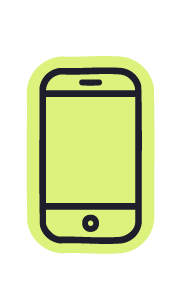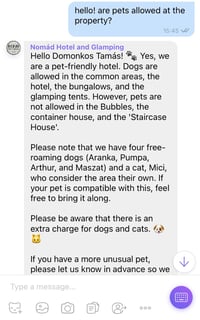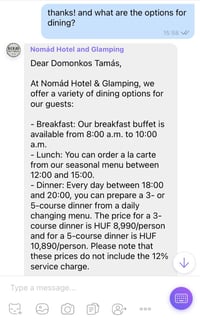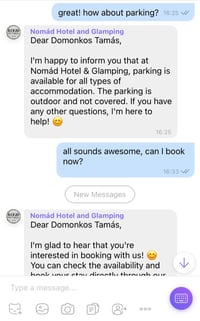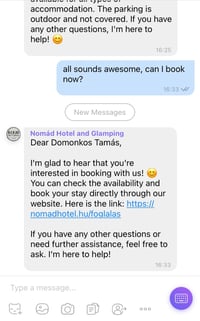About chatbots: understanding the competitive edge of hotel chatbots
It’s fair to say that very few hoteliers got into the hospitality industry in order to learn about Artificial Intelligence or Chatbots. And yet these technologies are making rapid inroads into how hotels operate, with increased efficiencies and benefits to both guests and hotels. Here’s the chance to get up to speed on the jargon, features, and benefits of the various systems on offer. So let’s chat about chatbots!
Going beyond the FAQs to engage with guests
We all know how the same old questions can be asked by potential guests, day in, day out. Sure, guests need to know details of a hotel’s offering, especially at the crucial first enquiry stage, but that can take a lot of telephone time with hard-pressed front desk or back office colleagues. There are so many other things they could be doing, like engaging with current guests, rather than dealing with simple Frequently Asked Questions: (How to get to the hotel? Is there parking? What time is breakfast? Are pets allowed? And so on).
Automation to answer such queries is exactly what has happened in many industries, with increasing use of bot systems to shuffle customers in queues, and pre-sort people’s needs, before often handing them on to a human operator. That works quite well for a bank or energy supplier, but the hospitality business is rooted in people-to-people interactions, so hotels have been slower to adopt such systems. Nevertheless, as the technology has become more seamless, and specialist software providers that understand the hospitality industry have come on board, there has been an increasing trend for hotels to use chatbots to engage with guests. A Statista study from 2022 showed that chatbot usage in the hospitality sector was expected to increase by 53% overall, with the figure rising to 64% for independent hotels.
Chatting to bots using text systems for speed and accuracy
Initially hotel chatbot applications weren’t all that smart, and have tended to be text-based ‘widgets’ which pop up when a customer browses a hotel’s website. These bots are unintrusive and usually appear as a bubble icon at the bottom of a webpage. They offer help - in text form - and the user has to type in their query, which is answered almost instantly, also in text form. The advantage for the customer is they get assistance quickly, when they need it. A disadvantage is that they are tied up in writing questions and reading answers, but in the short term, this remains the way most hotel chatbots are accessed. So what’s going on ‘underneath the hood’ when a chatbot for a hotel is operating, and why are some newer generation models more seamless than those of the recent past?
The technology and logic behind hotel chatbots
Although we tend to think of the chat technologies available until recently as ‘understanding’ our requests, in reality their responses are based on complex trees of what programmers term ‘if/else’ decisions. If one thing is true, then the tree will branch to the next logical question. If it is not true, then this will prompt a further option, or a further clarifying question. If, for example, a guest answers ‘Yes’ to the question ‘Would you like to book a room?’, then the next branch will involve asking for which nights and for how many people. In other words, it’s basically the same as a human operator would do, but in a sometimes less flexible way. This is why many hotel chatbots request that potential guests ask only one question at a time, and phrase it as simply as possible.
The Rule Based approach to chatbots for hotels
So when a basic hotel chatbot is being queried by a guest, it is this rule based system which responds only within set parameters. These will have been carefully designed by the software company responsible for the bot, working in cooperation with hoteliers. There are ‘off the peg’ chatbots, but almost all will require a degree of customisation to suit the needs of a particular hotel. Rule based chatbots derive their rules - the multi-forking branches of the tree - in a strictly defined environment where logic determines every next step. This is why sometimes chatbots fail to follow customer’s requests, because the requests are outside the scope of the pre-programmed responses. For example, a chatbot may tell a guest when check in is available, but might not be able to respond to a request for early check in. The rule based approach does have ‘intent detection’ which uses keywords that are recognised (such as ‘I want to book a room’), however longer messages are more difficult - or impossible - for the system to process (such as ‘I want to book a room for two adults and one child from next Tuesday through Thursday’).
The Artificial Intelligence approach for hotel chatbots
Newer forms of chatbots leverage the ever increasing power of Artificial Intelligence, where there is more latitude for interpretation on the part of the bot. There are still rules, but they are less hierarchical, and crucially the system can ‘learn on the job’. ChatGPT has had a huge impact in the media, but is actually just the first of many Large Language Models which are generative. By using truly vast samples of language flows, the AI seeks to - in effect - predict what the next word in a sentence will be. If I say ‘I am thirsty, I would like a…’ Artificial Intelligence will leap to the nearest likely next word as being ‘drink’, then next choice ‘water’, and so on. These systems are then trained, both by their own neural networks, and also by human operators who understand the particular jargon of an industry. So all the specialist terms used in the hospitality industry are painstakingly fed into the system. If hotel guests more frequently say they want a cold drink, then AI will recognise this linguistic trend. The result is more fluid and adaptive responses, which mirror human interactions.
Speaking aloud is the new frontier in hotel chatbots
Now this is all very good, but potential guests are still texting their queries, right? In a typical hotel chatbot example, hoteliers tend to favour the discrete use of text, but consumers in general are becoming ever more comfortable with voice-based systems - witness how many people conduct their business and leisure activities through voice assistants such as Alexa and Siri. Newer chatbots are able to utilise voice technologies, and this will increasingly be expected by guests. Hands-free querying and booking is so much better for people who are doing other things, or are on the move. To understand what’s happening with voice technology, it’s easiest to view it as ‘sitting on top’ of the existing text based systems we’ve already described. Voice recognition through Natural Language Processing analyses a person’s speech, then very rapidly turns it into a text document, which in turn interacts with the software, be it rules-based or AI-assisted. The bot then provides its answer in text form, which a voice engine then synthesises back into speech. The point is that speech is an add-on, rather than a completely new technology, which means that as demand grows for voice it will be relatively simple to implement for hotel chatbots.
Chatting in the guest’s own language creates personalisation
Few hotels can muster more than a handful of languages among customer-facing staff, and certainly not on a 24/7 basis. Hotel chatbots however can respond in many languages, which creates a personalised feeling, and ensures that there is greater clarity between the hotel and the guest. If using an AI-assisted chatbot, and especially with voice recognition and reproduction, then the sense of engaging with a real human can be very convincing. It is worth noting that bots don’t function as ‘universal translators’ however, although month-on-month multilingualism is improving. Arabic, for example, is currently poorly served by speech engines because of the speed of native speakers, and the very wide range of dialects in use. However, given that the growth and improvements in the interwoven technologies of AI, LLMs, Voice, and general Chat offerings is exponential, the use of hospitality industry chatbots which converse in different languages is a coming trend.
So is it best to wait for hotel chatbots to mature?
It’s a reasonable question for any hotelier to ask: ‘Why don’t I just wait for a while to see when the best of breed emerges, and then maybe I’ll buy into that.’ The answer is several fold:
- Everything about hotel chatbots is software-based, meaning that the bot can be consistently updated and improved, just as we all regularly receive refreshes for our personal computers and mobile phones. There’s therefore no need to wait.
- All of the software is ‘in the cloud’, so the onus isn’t on a hotel to keep hardware up and running, or have maintenance schedules in place. The action happens offsite in the security of massive, hyper-protected servers.
- The simple fact is that chatbots are becoming common in the hospitality industry, and many competitor hotels are already using them, or soon will be. Can any smart hotelier afford to be so far behind the curve that they will later have to run hard to catch up?
- Many providers offer a subscription service, making the chatbot affordable, available for contracted periods, and upgradable over time as the hotelier decides to move from basic to more sophisticated hotel chatbot guest interactions.
- Guests increasingly expect a 24/7 personalised response from hotels, and chatbots go a long way to providing this, especially when many can function well in a variety of major languages.
The uniquely winning hotel chatbot integration
OK, so chatbots work, are ever-improving, and are upgradeable. If only there was a trusted route to help hoteliers get started on automating their 24/7 service with guest enquiries!
Well, that’s where we come in: SabeeApp is a very well-established software company working specifically in the hospitality industry, with over ten years of worldwide trusted experience with our ‘All in one’ Property Management System. SabeeApp’s solutions cover every aspect that modern hoteliers need, with one exception - until now we didn’t have a chatbot offering. That’s now changed as we announce a new partnership with Bonomi, the AI-first guest messaging service powered by ChatGPT. This allows the hotel to connect with guests through most of the popular messaging apps, such as WhatsApp, Messenger, Instagram, and Viber.
The SabeeApp and Bonomi joint proposition is unique, and unmatched in the market, because it offers a seamless messaging experience throughout the entire guest journey: From website to booking engine, from pre-stay WhatsApp messaging, to Messenger availability in Guest Advisor, guest communication is intertwined at all the digital touchpoints of the hotel. This deep integration enables hoteliers to create a personalised guest experience through conversations in valuable direct channels.
This is a real life example of Bonomi's chatbot in action:
Currently widget-based (and therefore non-intrusive to guests on first browsing the hotel website), Bonomi is easy to use, and integrates with your website. It therefore offers messaging availability form the very start of the booking process. What’s more, it’s fully customisable to fit the exact needs of a hotel, and also integrates perfectly with SabeeApp’s PMS tools such as Booking Engine, Payment Gateway, and the whole additional suite of SabeeApp’s Smart Solutions. Personalised pre-stay WhatsApp messages can be sent - based on the Property Management System data - to the phone number used in the reservation. Existing SabeeApp client hotels simply sign up with a monthly fee to Bonomi, and the whole power of two fully integrated systems can be switched on through the SabeeApp PMS Marketplace. Is this the best hotel chatbot? Well, take a look at some of the features and benefits:
8 reasons to choose SabeeApp, and Bonomi’s chatbot
Hotel chatbots are becoming accepted by hotels worldwide, and even expected by guests, as they can provide timely assistance with Frequently Asked Questions. FAQs often need answers at the crucial point that a potential guest is first browsing a hotel website, and chatbots can help convert potential guests into actual guests. The combination of two powerful integrated software offerings results in a number of benefits:
1. Ease of use for staff and guests alike
The intuitive Bonomi interface makes it a breeze for hotel staff to communicate with guests, and with little training required, can be up and running within a few days. Guests also find the software simple and clear to use, because with Bonomi they are communicating through their own well known and favoured messaging apps, so from the start there is an easy dialogue established. This means guests stay in their ‘comfort zone’ - a huge plus.
2. Workload reduction to free up staff
A clear benefit comes in the workload reduction for hotel staff derived from the use of messaging channels and chatbot automation. When a hotel utilises messaging, the number of phone calls and emails drop significantly as guests prefer to use familiar messaging channels. This results in few unanswered calls or forgotten emails, and as messages are easier to track, and answering can be fully automated through the chatbot, more messaging requires less effort to ensure happy guests.
3. Multilingual Communication - in 150 languages
The dream of having clear communication in up to 150 languages - via text - is now possible through Bonomi’s custom AI, ChatGPT-enabled assistant. This opens up potential bookings from more people, more easily, and of course it’s 24/7. Guests usually prefer to communicate in their native language, and this is now possible.
4. Smooth interconnection with Social Media and Messaging apps
Bonomi has the ability to seamlessly interconnect with messaging apps and social media, providing rich new channels of communication to guests, and providing greater control of the communication channels. Typically Online Travel Agents provide a ‘masked’ email to guests, which is then deactivated a few days after check out, leaving very limited opportunities for post-stay communication between hotel and guest. In contrast, the SabeeApp and Bonomi integration provides more personalised assistance, in a timely manner that suits guests’ chosen communication channels. From the get-go guests feel that they are being ‘seen and heard’ as individuals, and post-stay the ‘lines remain open’.
5. Customised content for greater guest engagement
When Bonomi is connected to SabeeApp’s GuestAdvisor, the scope of personalised messaging is greatly expanded, allowing in-stay guests to receive information about special events and offers, or news about things going on in the area. Customised welcome messages, and post-stay thank you emails are also easily automated, helping to increase a guest’s sense of engagement.
6. Getting feedback and great reviews
The ability to get feedback from guests using Bonomi or GuestAdvisor means that a dialogue is established. Any problems can be dealt with effectively, and congratulations can also be responded to. Such proactivity encourages great responses from guests, and reviews on social media and OTA sites are the best ‘free marketing’ any hotelier can wish for. This then directly relates to the hotel's revenue, because based on review scores, hotels get better ranking with the OTAs, and therefore greater exposure and more bookings. In turn this can also allow hotels to increase their prices, which can improve Average Daily Rate and occupancy.
7. Enhancing the guest experience
This all adds up to enhancing the guest journey and experience, and a satisfied guest spreads the word to others, and is more likely to return to a hotel for a future stay. By establishing easy communication from the first to last touchpoints of the guest journey, chatbot use helps create loyalty, and improves the hotel’s brand reputation.
8. Increasing hotel revenue
This in turn can boost hotel revenue. Instant, personalised messaging and answers to FAQs can increase direct reservations, and generate more in-stay revenue. With Bonomi it’s easy to upsell services and promote upgrades because of the instant messaging available.
Bonomi’s ‘out of the box’ features include:
- Fully customisable answers to over 50 Frequently Asked Question topics and concierge messages. Bonomi supplies the templates for the most common FAQs, but everything can be tailor-made for the hotel.
- This degree of customisation is easily done by hotel staff, thanks to Bonomi’s very simple and understandable web app interface.
- The service is dynamic, with regular recommendations on expanding FAQ answers and adding custom FAQ topics. This is based on AI analysis of the conversation flows between guests and the chatbot.
- You can book a personal online demo of Bonomi to find out exactly how and why this is the guest messaging system for you, and the way forward for hotel chatbots.
The all-in-one hotel management system
At SabeeApp we’re very pleased to have a new partner in Bonomi, and we’re confident that Bonomi’s chatbot and guest messaging solutions are the perfect fit with our all-in-one hotel management system for modern hoteliers. We’re also very confident in our own cloud based solutions and would like to tell you more about our complete suite of tools, including:
Front-Desk System (Property Management System), Channel Manager, Internet Booking Engine, Payment Gateway, Smart Solutions, and a Unified Inbox. And now, with the addition of the Bonomi offering too!
We’d very much like to walk you through our system, so please book a free, no obligation consultation, and let’s get chatting!
